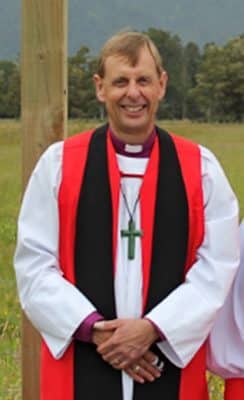After discussion surfaced earlier this year on the language that the Catholic Church uses to describe Anglican orders, the Anglican Bishop of Christchurch has questioned what formal recognition by Rome might mean in practice.

Anglican Bishop of Christchurch Peter Carrell
Bishop Peter Carrell wrote about this on his blog “Anglican Down Under”, after media coverage of the call by the Malines Conversations Group for the Vatican to review and overturn Leo XIII’s 1896 apostolic letter “Apostolicae Curae”, which declared Anglican ordinations “absolutely null and utterly void”.
“ . . . [W]hile I appreciate that a Roman recognition of Anglican orders would open doors to greater unity between our churches (something I am keen on), what would such recognition mean in practice?” Bishop Carrell asked.
“Would it mean recognising the validity of men in the priesthood but not women? Would it mean Anglican priests could be appointed to vacant positions in Roman Catholic parishes? Could it mean that Catholics were permitted to receive communion when at an Anglican service? And vice versa? At an ecumenical service when Anglicans and Catholics join together for special occasions such as Ash Wednesday?
“Obviously some important work needs to take place at a theological-conceptual level; and the dratted Papal Bull on the nullity and voidness of Anglican orders needs some deft footwork to get around it, etc. But I think I am more interested in the actuality on the ground of some changes in practice, whatever the carefully formulated subtleties we move forward on at a high, but somewhat theoretical level, are . . . “
Bishop Carrell also noted that it was “a bit of a complicated matter”.
“I mean, the validity of Anglican orders is the validity of the orders as ordered by God, not as validated by the Roman Catholic church . . . isn’t it?”
The Malines Conversation Group is made up of Catholic and Anglican theologians.
Earlier this year, CNS reported that Bishop Brian Farrell, secretary of the Pontifical Council for Promoting Christian Unity, said that while his Vatican office does not sponsor the Malines group’s dialogue, “we are very happy” that the question of Anglican orders is “being examined in the wholly different ecumenical context of today, when so much has been achieved in Anglican-Catholic relations”.
“From the Catholic point of view, it is a question of finding the theological and canonical language that would better reflect what we do in practice, which is to acknowledge a genuine ministry in other churches,” he told the Catholic News Service. “As the Second Vatican Council teaches, the Holy Spirit does indeed work through them for the salvation of their members.”
Bishop Carrell posted a link to a story in the UK Catholic weekly The Tablet, where journalist Christopher Lamb wrote that he understood that the issue of Anglican orders had been raised directly with the Pope a few months ago. Pope Francis reportedly asked for the question of be considered by Vatican officials.
“While there is no sign that ‘Apostolicae Curae’ will be overturned,” Lamb wrote, “for several decades Rome has been moving away from the language used by Leo XIII and towards a recognition of the fruits of Anglican ministry. It is already a very different approach to the one found in the Congregation for the Doctrine of the Faith’s 1998 document, Professio Fidei, which claimed that the teaching on Anglican orders was one of the ‘truths connected to revelation’, and was to be held definitively.”
The CNS article noted that the theological and canonical motivations for Pope Leo’s decision, as explained in a document issued by the Malines group, were “defects” of both form and intention in the Anglican ordination rites because, in the Vatican’s eyes, “it was not made clear that the priest received ‘the power of consecrating and of offering the true Body and Blood of the Lord’”, and because the Anglican Communion had introduced a rite not approved by the Church.
But the official agreed statements of the Anglican-Roman Catholic International Commission since 1970, including statements on the Eucharist and on ministry, “testify to an intimate family likeness between our traditions, which reveals a communion already shared”, said the Malines group in its document “Sorores in Spe”, released last year.
Those who drafted “Sorores in Spe” insisted that the arguments for or against the ordination of women are different from the arguments used by Pope Leo in “Apostolicae Curae” to declare Anglican orders null and void.
“The fact that women can, in most Anglican provinces, now be ordained, does not in itself mean that the Pope’s condemnation of 1896 must be applied to the present situation,” they wrote.
Reader Interactions